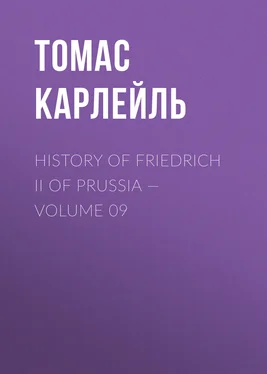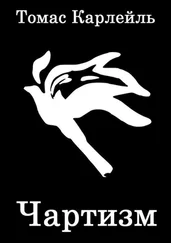Томас Карлейль - History of Friedrich II of Prussia — Volume 09
Здесь есть возможность читать онлайн «Томас Карлейль - History of Friedrich II of Prussia — Volume 09» — ознакомительный отрывок электронной книги совершенно бесплатно, а после прочтения отрывка купить полную версию. В некоторых случаях можно слушать аудио, скачать через торрент в формате fb2 и присутствует краткое содержание. Жанр: foreign_prose, История, literature_19, foreign_edu, foreign_antique, на английском языке. Описание произведения, (предисловие) а так же отзывы посетителей доступны на портале библиотеки ЛибКат.
- Название:History of Friedrich II of Prussia — Volume 09
- Автор:
- Жанр:
- Год:неизвестен
- ISBN:нет данных
- Рейтинг книги:3 / 5. Голосов: 1
-
Избранное:Добавить в избранное
- Отзывы:
-
Ваша оценка:
- 60
- 1
- 2
- 3
- 4
- 5
History of Friedrich II of Prussia — Volume 09: краткое содержание, описание и аннотация
Предлагаем к чтению аннотацию, описание, краткое содержание или предисловие (зависит от того, что написал сам автор книги «History of Friedrich II of Prussia — Volume 09»). Если вы не нашли необходимую информацию о книге — напишите в комментариях, мы постараемся отыскать её.
History of Friedrich II of Prussia — Volume 09 — читать онлайн ознакомительный отрывок
Ниже представлен текст книги, разбитый по страницам. Система сохранения места последней прочитанной страницы, позволяет с удобством читать онлайн бесплатно книгу «History of Friedrich II of Prussia — Volume 09», без необходимости каждый раз заново искать на чём Вы остановились. Поставьте закладку, и сможете в любой момент перейти на страницу, на которой закончили чтение.
Интервал:
Закладка:
I perceive he read a great deal at Ruppin: what Books I know not specially: but judge them to be of more serious solid quality than formerly; and that his reading is now generally a kind of studying as well. Not the express Sciences or Technologies; not these, in any sort,—except the military, and that an express exception. These he never cared for, or regarded as the noble knowledges for a king or man. History and Moral Speculation; what mankind have done and been in this world (so far as "History" will give one any glimpse of that), and what the wisest men, poetical or other, have thought about mankind and their world: this is what he evidently had the appetite for; appetite insatiable, which lasted with him to the very end of his days. Fontenelle, Rollin, Voltaire, all the then French lights, and gradually others that lay deeper in the firmament:—what suppers of the gods one may privately have at Ruppin, without expense of wine! Such an opportunity for reading he had never had before.
In his soldier business he is punctual, assiduous; having an interest to shine that way. And is, in fact, approvable as a practical officer and soldier, by the strictest judge then living. Reads on soldiering withal; studious to know the rationale of it, the ancient and modern methods of it, the essential from the unessential in it; to understand it thoroughly,—which he got to do. One already hears of conferences, correspondences, with the Old Dessauer on this head: "Account of the Siege of Stralsund," with plans, with didactic commentaries, drawn up by that gunpowder Sage for behoof of the Crown-Prince, did actually exist, though I know not what has become of it. Now and afterwards this Crown-Prince must have been a great military reader. From Caesar's COMMENTARIES, and earlier, to the Chevalier Folard, and the Marquis Feuquiere; [ Memoires sur la Guerre (specially on the Wars of Louis XIV., in which Feuquiere had himself shone): a new Book at this time (Amsterdam, 1731; first COMPLETE edition is, Paris, 1770, 4 vols. 4to); at Ruppin, and afterwards, a chief favorite with Friedrich.] from Epaminondas at Leuctra to Charles XII. at Pultawa, all manner of Military Histories, we perceive, are at his finger-ends; and he has penetrated into the essential heart of each, and learnt what it had to teach him. Something of this, how much we know not, began at Ruppin; and it did not end again.
On the whole, Friedrich is prepared to distinguish himself henceforth by strictly conforming, in all outward particulars possible, to the paternal will, and becoming the most obedient of sons. Partly from policy and necessity, partly also from loyalty; for he loves his rugged Father, and begins to perceive that there is more sense in his peremptory notions than at first appeared. The young man is himself rather wild, as we have seen, with plenty of youthful petulance and longings after forbidden fruit. And then he lives in an element of gossip; his whole life enveloped in a vast Dionysius'-Ear, every word and action liable to be debated in Tobacco-Parliament. He is very scarce of money, too, Papa's allowance being extremely moderate, "not above 6,000 thalers (900 pounds)," says Seckendorf once. [Forster, iii. 114 (Seckendorf to Prince Eugene).] There will be contradictions enough to settle: caution, silence, every kind of prudence will be much recommendable.
In all outward particulars the Crown-Prince will conform; in the inward, he will exercise a judgment, and if he cannot conform, will at least be careful to hide. To do his Commandant duties at Ruppin, and avoid offences, is much his determination. We observe he takes great charge of his men's health; has the Regiment Goltz in a shiningly exact condition at the grand reviews;—is very industrious now and afterwards to get tall recruits, as a dainty to Papa. Knows that nothing in Nature is so sure of conciliating that strange old gentleman; corresponds, accordingly, in distant quarters; lays out, now and afterwards, sums far too heavy for his means upon tall recruits for Papa. But it is good to conciliate in that quarter, by every method, and at every expense;—Argus of Tobacco-Parliament still watching one there; and Rumor needing to be industriously dealt with, difficult to keep down. Such, so far as we can gather, is the general figure of Friedrich's life at Ruppin. Specific facts of it, anecdotes about it, are few in those dim Books; are uncertain as to truth, and without importance whether true or not. For all his gravity and Colonelship, it would appear the old spirit of frolic has not quitted him. Here are two small incidents, pointing that way; which stand on record; credible enough, though vague and without importance otherwise. Incident FIRST is to the following feeble effect; indisputable though extremely unmomentous: Regiment Goltz, it appears, used to have gold trimmings; the Colonel Crown-Prince petitioned that they might be of silver, which he liked better. Papa answers, Yes. Regiment Goltz gets its new regimentals done in silver; the Colonel proposes they shall solemnly BURN their old regimentals. And they do it, the Officers of them, SUB DIO, perhaps in the Prince's garden, stripping successively in the "Temple" there, with such degree of genial humor, loud laughter, or at least boisterous mock-solemnity, as may be in them. This is a true incident of the Prince's history, though a small one.
Incident SECOND is of slightly more significance; and intimates, not being quite alone in its kind, a questionable habit or method the Crown-Prince must have had of dealing with Clerical Persons hereabouts when they proved troublesome. Here are no fewer than three such Persons, or Parsons, of the Ruppin Country, who got mischief by him. How the first gave offence shall be seen, and how he was punished: offences of the second and the third we can only guess to have been perhaps pulpit-rebukes of said punishments: perhaps general preaching against military levities, want of piety, nay open sinfulness, in thoughtless young men with cockades. Whereby the thoughtless young men were again driven to think of nocturnal charivari? We will give the story in Dr. Busching's own words, who looks before and after to great distances, in a way worth attending to. The Herr Doctor, an endless Collector and Compiler on all manner of subjects, is very authentic always, and does not want for natural sense: but he is also very crude,—and here and there not far from stupid, such his continual haste, and slobbery manner of working up those Hundred and odd Volumes of his:—[See his Autobiography, which forms Beitrage, B. vi. (the biggest and last volume).]
"The sanguine-choleric temperament of Friedrich," says this Doctor, "drove him, in his youth, to sensual enjoyments and wild amusements of different kinds; in his middle age, to fiery enterprises; and in his old years to decisions and actions of a rigorous and vehement nature; yet so that the primary form of utterance, as seen in his youth, never altogether ceased with him. There are people still among us (1788) who have had, in their own experience, knowledge of his youthful pranks; and yet more are living, who know that he himself, at table, would gayly recount what merry strokes were done by him, or by his order, in those young years. To give an instance or two.
"While he was at Neu-Ruppin as Colonel of the Infantry Regiment there, the Chaplain of it sometimes waited upon him about the time of dinner,—having been used to dine occasionally with the former Colonel. The Crown-Prince, however, put him always off, did not ask him to dinner; spoke contemptuously of him in presence of the Officers. The Chaplain was so inconsiderate, he took to girding at the Crown-Prince in his sermons. 'Once on a time,' preached he, one day, 'there was Herod who had Herodias to dance before him; and he,—he gave her John the Baptist's head for her pains!'" This HEROD, Busching says, was understood to mean, and meant, the Crown-Prince; HERODIAS, the merry corps of Officers who made sport for him; JOHN THE BAPTIST'S HEAD was no other than the Chaplain not invited to dinner! "To punish him for such a sally, the Crown-Prince with the young Officers of his Regiment went, one night, to the Chaplain's house," somewhere hard by, with cow's-grass adjoining to it, as we see: and "first, they knocked in the windows of his sleeping-room upon him [HINGE-windows, glass not entirely broken, we may hope]; next there were crackers [SCHWARMER, "enthusiasts," so to speak!] thrown in upon him; and thereby the Chaplain, and his poor Wife," more or less in an interesting condition, poor woman, "were driven out into the court-yard, and at last into the dung-heap there;"—and so left, with their Head on a Charger to that terrible extent!
Читать дальшеИнтервал:
Закладка:
Похожие книги на «History of Friedrich II of Prussia — Volume 09»
Представляем Вашему вниманию похожие книги на «History of Friedrich II of Prussia — Volume 09» списком для выбора. Мы отобрали схожую по названию и смыслу литературу в надежде предоставить читателям больше вариантов отыскать новые, интересные, ещё непрочитанные произведения.
Обсуждение, отзывы о книге «History of Friedrich II of Prussia — Volume 09» и просто собственные мнения читателей. Оставьте ваши комментарии, напишите, что Вы думаете о произведении, его смысле или главных героях. Укажите что конкретно понравилось, а что нет, и почему Вы так считаете.









